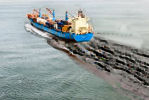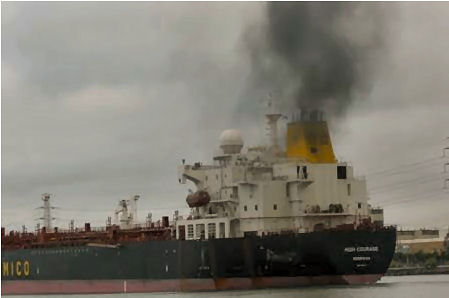 If you think aviation emissions are bad, the even bigger problem is the unregulated shipping industry.
If you think aviation emissions are bad, the even bigger problem is the unregulated shipping industry.
In terms of GHG emissions, shipping is already responsible for1:
· 5% of global CO2 emissions
· double global aviation emissions
· double Britain’s total emissions.
And it is growing fast. Under business as usual scenarios GHG emissions from shipping will rise 72% in next 15 years1 which is obviously incompatible with the internationally agreed 2°C goal that worldwide emissions be at least halved from 1990 levels by 20502.
If global shipping was a country:
· It would be the sixth largest producer of GHG emissions
• Only the US, China, Russia, India and Japan emit more CO2 than the world’s shipping fleet3
All the current port expansion projects are underpinning the business as usual scenario. Port of Melbourne for example, is planning to quadruple its container throughput by mid century – which means Victorians would have to more than triple our current container consumption per person, from 0.4 per annum to 1.4 container per person per annum.
1. http://www.theguardian.com/environment/2007/mar/03/travelsenvironmentalimpact.transportintheuk
2. http://ec.europa.eu/clima/policies/transport/shipping/index_en.htm
3. http://oceana.org/reports/shipping-solutions-technological-and-operational-methods-available-reduce-co2
Shipping is often touted as being the most efficient mode of transport – which it may be in terms of unit cost- but it has a deadly legacy for our environment, climate and our health. The 90,000+ cargo ships worldwide are responsible for:
• 9% of global sulphur oxide pollution
• 30% of global nitrogen oxide pollution
In the air, SO2 and NOx convert into fine sulphate and nitrate aerosol particles, and once in the lungs, these particles are small enough to enter the blood
• Accounting for ~ 50,000 premature deaths p.a. in EUROPE, at an annual cost of €58 billion4
• These particles can cause emphysema, congestive heart failure, birth defects and premature deaths
Other research5 suggests the particulate pollution causes:
· 60,000 deaths p.a. worldwide
• Costs $330 billion p.a. treating lung and heart diseases
4. http://www.transportenvironment.org/what-we-do/shipping/air-pollution-ships
5. Health risks of shipping pollution have been underestimated https://www.theguardian.com/environment/2009/apr/09/shipping-pollution
The shipping industry, with its flags of convenience, impenetrable registration and ownership, its transfer of thousands of marine and terrestrial pests (Fire ants in Queensland arrived by ship) and diseases such as cholera in ballast water, are a blight on the planet. And the industry avoids being held responsible for the mess.
The Prestige tanker disaster in Spain in 2002, spilled 84 million litres of oil on thousands of kms of coast of Spain, France and Portugal. It caused $12 billion in economic loss and clean up costs.
Finally, in 2013 the Spanish High court concluded it was impossible to establish criminal responsibility and the Captain & Chief Engineer were found not guilty of crimes against the environment.
Every year there are multiple such disasters around the world. The shipping industry is the James Hardie and tobacco industry of the sea.
 It's a relief to see Yemen use intelligence and a sense of humour to bring pressure on Israel and its backers' vicious attempts to obliterate Gaza-Palestine! Yemenis are now taking boatloads of tourists to sight-see on the Galaxy Leader, the part-Israeli-owned ship they captured on 19 November. You can also see them dancing in a line on its deck, here.
It's a relief to see Yemen use intelligence and a sense of humour to bring pressure on Israel and its backers' vicious attempts to obliterate Gaza-Palestine! Yemenis are now taking boatloads of tourists to sight-see on the Galaxy Leader, the part-Israeli-owned ship they captured on 19 November. You can also see them dancing in a line on its deck, here.
 The cruise industry is just as shameless as the rest of the shipping industry.
The cruise industry is just as shameless as the rest of the shipping industry. 
 If you think aviation emissions are bad, the even bigger problem is the unregulated shipping industry.
If you think aviation emissions are bad, the even bigger problem is the unregulated shipping industry.
Recent comments